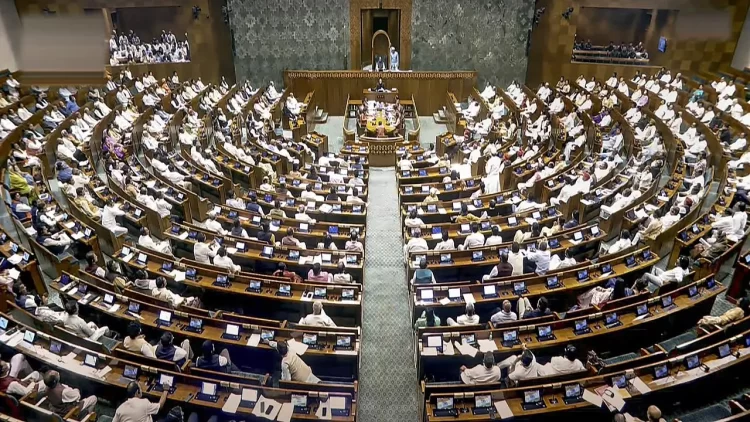As the Waqf (Amendment) Bill was tabulated in the Lower House of Parliament on Wednesday, it continued to be one of the main topics of discussion. In the early hours of Thursday, the Bill was finally passed by the Lok Sabha following an almost 12-hour-long debate. The Lower House passed the bill by a majority of 288 votes to 232.
Union Home Minister Amit Shah harshly criticized the previous UPA government and the 2013 revisions to Waqf regulations during his intervention in the Lok Sabha (Lower House of Parliament) on Wednesday during a debate over the controversial Waqf (Amendment) Bill 2025.
He outlined the major ramifications of these moves, such as the “transfer of 123 VVIP properties” in Delhi’s Lutyens zone to Waqf authorities, and described them as politically motivated steps that were hurriedly implemented prior to the 2014 elections.
HM Shah contended that without these changes, the current Bill would not have been required.
The Waqf Board is essential to maintaining accountability and avoiding money mismanagement, the Home Minister emphasized.
Prior to the vote, Union Parliamentary Affairs Minister Kiren Rijiju vigorously defended his government against claims that it was dividing people and targeting the Muslim community.
He clarified the distinction between Waqf and the Waqf Board, addressing concerns about non-Muslim involvement in religious matters.
“The court’s decree was presented, yet you refuse to accept the truth. After the Home Minister’s detailed explanation, this issue should not have resurfaced.”
On the Collector’s role, he remarked: “The collector’s duties include revenue and administration; he is the district’s welfare officer. If we cannot trust him, whom shall we trust?”
Amid controversies, the Minister emphasised the need for decisive action and accurate records. Referring to Parliamentarian Asaduddin Owaisi’s remark that the Bill is nothing but an insult to Muslims and why similar measures are not for Hindus, Rijiju noted: “Owaisi Sahab questioned why similar measures are not extended to Hindus. Provisions for Hindus already exist. For Islam, we are instituting measures for women and children, who are citizens of this nation.”
He added, “If someone claims ancestral land usage, the Waqf now demands proof. This transcends religion. Legal registration suffices, regardless of faith – all lands belong to the nation.”
Opposing the Bill, AIMIM chief and Hyderabad MP Asaduddin Owaisi “tore” it.
Jagdambika Pal, Chairman of the Joint Parliamentary Committee (JPC) on the Waqf (Amendment) Bill, earlier on Wednesday morning asserted that the bill would be passed in Parliament and would bring significant benefits to the Muslim community.
Speaking to IANS, Pal stated, “We have worked for six months, day and night, to present an elaborate report on this bill. The Opposition made several remarks regarding this, stating that it will be used to garner votes in the Bihar Assembly elections. However, despite all such baseless claims, the bill will be passed today.”
In the face of criticism and worries, Syed Naseruddin Chishty, the chairman of the All India Sufi Sajjadanashin Council, denied on Wednesday that certain Muslim organizations would seize religious properties after the Waqf (Amendment) Bill was approved by the House.
Declaring that the measure merely aims to impose more stringent controls to stop the misuse of Waqf properties, he advised people not to trust such claims.
Gaurav Gogoi, a Congress Lok Sabha MP, vehemently opposed the Bill in the House, describing it as a “attack” on the Constitution and Parliament.
Additionally, he said that the Bill “targeted” the Muslim community and that the government had four “key objectives” behind it.
Samajwadi Party President Akhilesh Yadav also sharply criticised the government, saying that the introduction of the Waqf Bill symbolised its failures.
While participating in the debate on the Waqf Board Amendment Bill 2025 in Lok Sabha, he questioned the coherence of terms like “Unified Waqf Management”, suggesting that the Bill’s essence, whether articulated in English or Hindi, remained incomprehensible.
Senior Congress leader Rashid Alvi on Wednesday assured that the Congress would revise the Waqf law when it comes to power in 2029 as the Lok Sabha witnessed a spirited discussion on the Waqf (Amendment) Bill, 2025, as proposed by a JPC, and tabled by Kiren Rijiju for consideration and passage.
National Commission for Minorities (NCM) chairman Iqbal Singh Lalpura extended support to the Waqf (Amendment) Bill on Wednesday, as Lok Sabha holds a marathon discussion on the contentious legislation.
Lalpura told IANS that the legislation is in the larger interest of the community, and it will not cause any harm to the people of the Muslim faith.
Meanwhile, all political parties from Jammu and Kashmir, except the BJP, opposed the Waqf (Amendment) Bill, saying it is intended to disempower Muslims and only target one religion. Chief Minister Omar Abdullah said that the Bill is not acceptable to his party.
Congress Spokesperson Pawan Khera has slammed the Waqf (Amendment) Bill, describing it as not only “anti-Muslim” but also “anti-constitutional.”
Khera claimed that the Bill is a direct assault on the core principles of the Indian Constitution, particularly those envisioned by B.R. Ambedkar – “equality, federalism, and minority rights.”
Kerala Congress MP K.C. Venugopal also launched a scathing attack on the Center over the “discriminatory” Waqf Amendment Bill, claiming that the bill’s sole purpose was to forward its mission of hatred and religious division.
Source: IANS







 Finance
Finance







